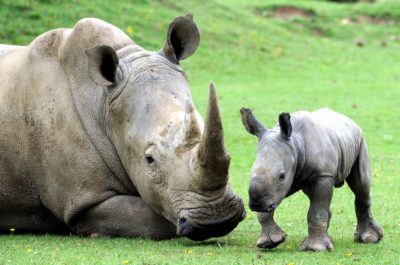On April 5, 2017, South Africa’s Constitutional Court legalized domestic trade in rhino horn against the South African government’s desire to keep the ban in place. South Africa is home to 70% of the world’s dwindling population of rhinos, and the decision has sparked questions about the potential impact on poaching and rhinos’ survival in the country.
While the Convention on the International Trade in Endangered Species of Wild Fauna and Flora (CITES) has banned international trade in at least some species of rhinos since 1977, a domestic ban on trade in rhino horn in South Africa was not on the books until June 2009. A legal battle over the ban has moved through the courts for years since two South African rhino farmers—who raise the animals to sell to zoos and game reserves for trophy hunters, and to harvest their horns—sued the government in response to the ban. The farmers had been de-horning their rhinos and stockpiling their horns for years, before the ban effectively made their stock worthless.
Domestic vs. International Trade
The South African government plans to implement regulations to establish a level of control over the newly legalized domestic trade in rhino horns. The regulations will require permits for buying or selling rhino horns, but foreigners will be able to export a maximum of two horns for “personal use.” Dr. Edna Molewa, the South African Minister of Environmental Affairs, also underscored that “this [Constitutional Court decision] does not relate to the international trade in rhino horn for commercial purposes. Commercial international trade in rhino horn is still prohibited” under CITES.
However, the government’s proposed regulation allowing tourists to export a limited amount of horn for “personal use” is concerning—it would still potentially allow farmers access to the primary consumers of rhino horn in Asia. Additionally, legalization of domestic trade in South Africa could influence CITES member discussions about captive-produced animals and might ultimately put legalizing international trade in rhino horn back on the table—a proposal that South Africa has contemplated submitting in the past.
A Future for Rhinos
Rhino populations were once abundant throughout Africa and Asia with an estimated worldwide population of 500,000 in the early twentieth century. A poaching epidemic has decimated all five-known species of rhino, resulting in the extinction of the Western black rhino in 2011, and leaving the remaining species critically endangered.
The National Whistleblower Center’s (NWC) Global Wildlife Whistleblower Program is working with NGOs around the world to educate communities on the monetary rewards available to whistleblowers who report wildlife trafficking. Both U.S. citizens and non-U.S. citizens are eligible for rewards and can report wildlife crime confidentially HERE.



